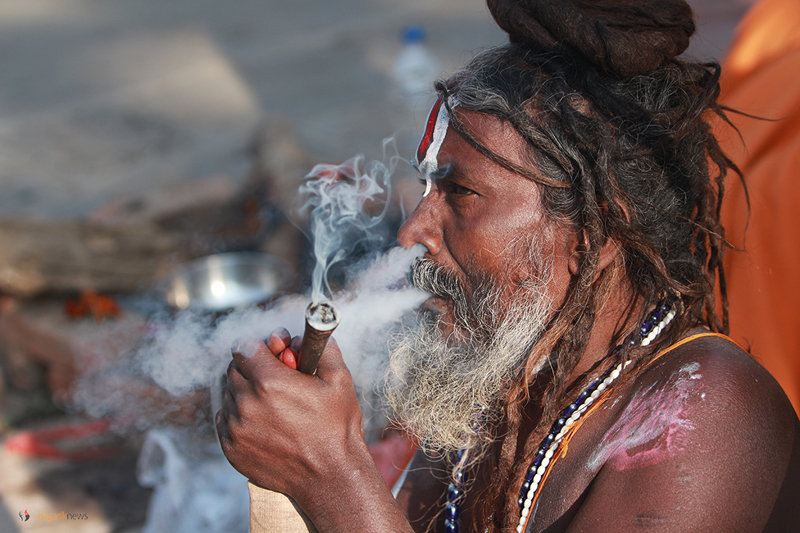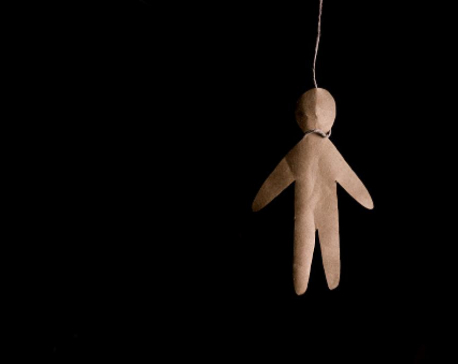
OR

A few years ago, one of my friends from the UK happened to be in Nepal around this time of the year specifically the fortnight covering the ‘Shivaratri’ and Holi festivals. He hadn’t come here for spiritual reasons (although he may beg to differ), to revel in water or color fights or even to find the ‘meaning of life’ – that curious pursuit that tends to preoccupy a lot of visitors from the western hemisphere. He was here simply because he happened to be a ‘herbally’ inclined tourist which actually got me thinking whether his arrival was simply a coincidence or a carefully orchestrated visit. I’m given to thinking it was probably the latter.
Whenever I told him that weed was strictly illegal in Nepal, he tended to brush me off. I had prepared myself to be called to bail him out if he ever got into trouble but over a week into his stay I started to have my doubts seeing the ease with which he procured and smoked copious amounts of the substance during his time here. I’m not entirely sure if it was a conscious relaxation of the rules during this time period or a case of lady luck being really kind to him. If I remember correctly, a few years ago there used to plain clothed policemen around the Pashupatinath area during Shivratri. Lately though, we don’t hear of any arrests or offences, so I assume that our cops have tended to relax a little bit – perhaps from inhaling all that second-hand smoke.
Religion may be the opium of the masses but in this case religion alone isn’t enough for people. It’s no secret that the use of cannabis and its derivatives amplifies around this time of the year given that it is associated with the worship of Lord Shiva. In the Vedas, it is even referred to as a ‘source of happiness’ and many of our younger folks seem to think that these facts lend it a degree of legitimacy. You can see significant numbers of them looking to obtain the stuff from ascetics and sadhus who throng Pashupatinath during Shivratri.
Even though it’s called ‘shivaji ko prasad’ you won’t exactly find people distributing it around like your run of the mill ‘prasad’. These sadhus are permitted to partake of the ‘prasad’ inside the temple premises but not to sell or give it to others because, religious reasons or not, the act of smoking pot is frowned upon unless you happen to be a sadhu. While many devotees would balk at the idea of smoking the substance, a lot of them would have tried its milder and seemingly more acceptable cousin – ‘bhang’. ‘Bhang’, usually consumed during Holi, has the same psychotropic properties if consumed in similar quantities but perhaps being mixed with milk products and sweets lends it an air of acceptability. At least, it’s visually more palatable than people exhaling clouds of smoke into the air.
The use of cannabis in Nepal is not just limited to Shivratri and other festivals because its use is relatively widespread in Nepal. In fact, some areas around the Kathmandu Valley are herbal hotspots with people often making trips in large groups to procure ‘organic’ weed in big quantities. And contrary to popular perception it’s not the exclusive preserve of ‘hippie’ looking tourists that throng Thamel on any given day. There are college students and blue and white collar workers alike who use it both as a cheap (and relatively less risky) high or to de-stress from their daily routines without necessarily being slaves to it. It’s not unlike what a moderate drinker would do.
That all of this is done on the sly has a lot to do with its status as an illegal drug but a not insignificant part of the reason is also the social stigma attached to it; being labelled a ‘drug addict’.
There are many people (including me) who believe it is less risky than alcohol and there certainly are enough grounds for its legalization. While there are accusations that it tends to make one unproductive, it perhaps differs on a case by case basis. Its ‘pacifying’ nature compares it favourably to the effects of alcohol which is responsible for more social ills that cannabis use probably ever will. It sounds really controversial to legalize it but when you consider the damning evidence against alcohol use and abuse it really shouldn’t be. Perhaps legalizing and taxing it will curtail the use of more dangerous narcotics including synthetic versions of these very substances that are found in most countries.
No one is advocating for Nepal to be turned into one giant Freak Street but more advanced countries have brought in legislation that allows them to control and benefit off the trade in cannabis. We could replicate that in Nepal but unlike the act of smoking you will be advised against holding your breath for this one.
The writer loves traveling, writing, and good food when he is afforded an escape from the rat race. He can be contacted at gunjan.u@gmail.com
You May Like This

Suicide is not the answer
Suicide is an illegal way of ending your own life to preassembly escape from pain and suffering. Globally, eight hundred... Read More...

Let bygones be bygones
All I want is to sway you from your ground Hold you tight and not let you go ever And... Read More...

Born different, Born able
‘K herya’ is the sticker in my phone to show when people stare at me for too long,” says Rewati. Read More...




Just In
- MoHP cautions docs working in govt hospitals not to work in private ones
- Over 400,000 tourists visited Mustang by road last year
- 19 hydropower projects to be showcased at investment summit
- Global oil and gold prices surge as Israel retaliates against Iran
- Sajha Yatayat cancels CEO appointment process for lack of candidates
- Govt padlocks Nepal Scouts’ property illegally occupied by NC lawmaker Deepak Khadka
- FWEAN meets with President Paudel to solicit support for women entrepreneurship
- Koshi provincial assembly passes resolution motion calling for special session by majority votes







_20220508065243.jpg)






Leave A Comment